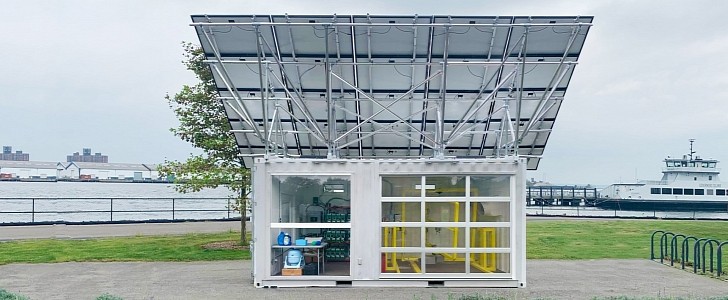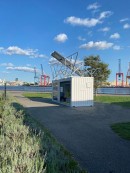The issue of plastic waste is a global one that can no longer be ignored, especially considering that plastic products are still being sold in massive quantities all over the world. This portable, off-grid MicroFactory made from shipping containers aims to make a difference.
Developed by New York-based company Circular Economy Manufacturing (CEM), the MicroFactory is solar-powered and uses post-consumer plastics to give them a new purpose. The company turns single-use plastic into new, well design products, harnessing just the power of the sun to do so. It is a harmless process that doesn’t produce any waste or polluting substances.
With a roof full of solar panels, the MicroFactory collects the solar energy and stores it in its batteries, which power the machinery used to process the plastic. CEM’s MicroFactory is equipped with a rotational molding machine and a plastic shredder, both powered by the aforementioned batteries. The factory comes with transparent walls that allow anyone to see what goes on inside.
Transforming the plastic into a new, eco-friendly product is a multi-step process. First, the plastic has to go through the shredder where it is turned into plastic flakes. Those flakes are then rinsed in a washer and placed into the rotational molding machine, which spins them and coats the interior of the mold with liquid plastic. The last step is for the mold to be left to cool and the plastic within to solidify.
Circular Economy Manufacturing buys the plastic locally, from a recycling plant in Brooklyn, but the great thing about its MicroFactory is that it is portable. The company plans to place such facilities all over the country, making CEM part of a circular economy instead of a linear one.
A linear economy is based on collecting the raw material, processing it, and turning it into a product that will eventually become waste, once it's no longer useful. On the other hand, a circular economy recycles the product and reuses it, minimizing waste and focusing on sustainability.
With a roof full of solar panels, the MicroFactory collects the solar energy and stores it in its batteries, which power the machinery used to process the plastic. CEM’s MicroFactory is equipped with a rotational molding machine and a plastic shredder, both powered by the aforementioned batteries. The factory comes with transparent walls that allow anyone to see what goes on inside.
Transforming the plastic into a new, eco-friendly product is a multi-step process. First, the plastic has to go through the shredder where it is turned into plastic flakes. Those flakes are then rinsed in a washer and placed into the rotational molding machine, which spins them and coats the interior of the mold with liquid plastic. The last step is for the mold to be left to cool and the plastic within to solidify.
Circular Economy Manufacturing buys the plastic locally, from a recycling plant in Brooklyn, but the great thing about its MicroFactory is that it is portable. The company plans to place such facilities all over the country, making CEM part of a circular economy instead of a linear one.
A linear economy is based on collecting the raw material, processing it, and turning it into a product that will eventually become waste, once it's no longer useful. On the other hand, a circular economy recycles the product and reuses it, minimizing waste and focusing on sustainability.











